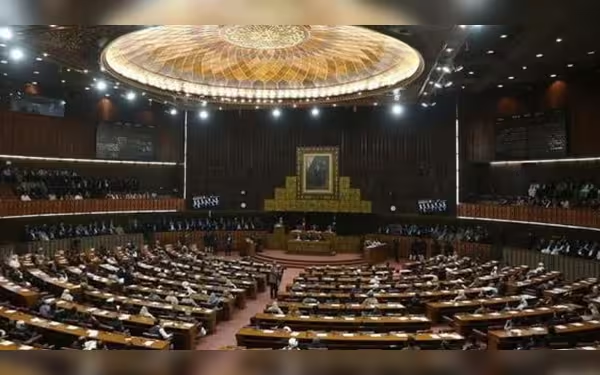Saturday, November 16, 2024 07:26 PM
Pakistan Government Proposes Chief Justice Tenure Amendment in Parliament
- Proposed amendment increases retirement age to 68 years.
- Chief Justices to serve fixed three-year terms.
- Concerns raised over potential political interference.
 Image Credits: en.dailypakistan.com.pk
Image Credits: en.dailypakistan.com.pkPakistan's ruling alliance introduces a Chief Justice Tenure Amendment to revise retirement age and appointment procedures in Parliament today.
ISLAMABAD – In a significant move, the Pakistani ruling alliance is set to introduce a major constitutional amendment in Parliament today. This proposed change is aimed at revising the retirement age and appointment procedures for judges and other officials, which has been a topic of much discussion and debate in recent times.
The proposed amendment seeks to increase the retirement age for all government employees to 68 years. This change is expected to allow experienced individuals to continue serving in their roles, thereby enhancing the quality of governance. Additionally, the amendment introduces a fixed three-year term for Chief Justices, who will be appointed based on seniority. This is a notable shift from the current system, which has faced criticism for its lack of transparency and consistency.
Supporters of the amendment argue that it will bring much-needed stability to the judiciary and ensure that the most qualified individuals are appointed to these crucial positions. By establishing a clear term limit for Chief Justices, the amendment aims to prevent any potential misuse of power and promote accountability within the judicial system.
However, critics of the proposal express concerns that such changes could lead to political interference in the judiciary. They fear that appointing Chief Justices based on seniority might not always result in the best candidates being chosen for the role. The balance between maintaining judicial independence and ensuring accountability is a delicate one, and this amendment could tip the scales in unforeseen ways.
As the ruling alliance pushes forward with this amendment, it is essential for all stakeholders, including legal experts, political analysts, and the general public, to engage in constructive dialogue. Understanding the implications of such changes is crucial for the future of Pakistan's judicial system. The outcome of this amendment could shape the landscape of governance in the country for years to come, making it a pivotal moment in Pakistan's political history.
While the proposed Chief Justice Tenure Amendment aims to enhance the judicial framework in Pakistan, it is vital to approach these changes with caution. The balance between experience and accountability must be carefully navigated to ensure that the judiciary remains a pillar of democracy and justice in the country.













